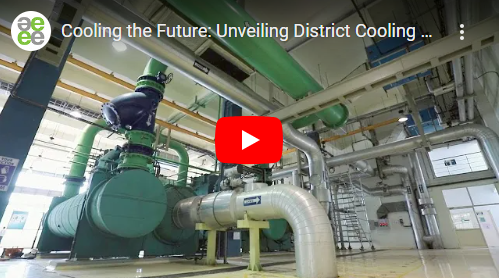Accelerating the implementation of energy efficient cooling in India
India is the second fastest-growing economy in the world. Increasing income levels, urbanization, industrialization and rising temperatures have led to a growth in demand for room air conditioners (RACs). Space cooling is no longer a luxury and has rather become a necessity for the occupants in commercial as well as residential buildings. Cooling is also linked to human health and productivity. Because of this, it has become necessary to gain maximum efficiencies at the equipment and system levels to minimize the massive impact of energy consumption in buildings.
The national cooling demand for space cooling in new commercial buildings or similar lies in the range of 110 million tons of refrigeration (TR) by the year 2037-38. It is estimated that by 2038 approximately 51 million TR of the national space cooling demand could theoretically connect to district cooling systems (DCSs). If this level of demand were served by district cooling, it would reduce the need for up to 22GW of power capacity and reduce 27 million tons of CO2 emissions annually. However, very strong policies and regulatory mechanisms would be required to trigger such market development and the study projects a more realistic scenario that 13 million TR is established by 2038 albeit still with significant policy support.
In 2019, India was one of the first countries in the world to develop a comprehensive “India Cooling Action Plan” (ICAP) which has a long-term vision to address the cooling requirement across sectors and lists out actions, which can help reduce the cooling demand. The ICAP provides a 20-year perspective and outlines actions needed to provide access to sustainable cooling.
In order to facilitate the implementation of ICAP with district cooling listed as a ‘not-in-kind’ technology, the Bureau of Energy Efficiency (BEE) India and Deutsche Gesellschaft für Internationale Zusammenarbeit (GIZ) GmbH signed an implementation agreement in 2019 with financial support through the International Climate Initiative (IKI) of the Government of Germany (BMWK).
As per the agreement, the project of ‘Accelerating the implementation of energy-efficient cooling in India’ supports the BEE in the implementation of the ICAP concerning energy-efficient centralized space cooling systems or district cooling systems, taking into account the positive climate effects of non-partially fluorinated or partially halogenated refrigerants.
The activities of UNEP-CCC (formerly UNEP-DTU Partnership) in phase 1 (2019-2023) include:
- Draft chapters of district cooling guidelines in India.
- Review of documents on district cooling pre-feasibility studies and questionnaires.
- Provide technical assistance and advisory on the development of pilot projects, evaluation tools and business models.
Get in touch

Zhuolun Chen
Senior Advisor

Trupti Yargattimath
Project Officer

Clara Camarasa
Senior Advisor

Aristeidis Tsakiris
Advisor - Knowledge Management Systems

